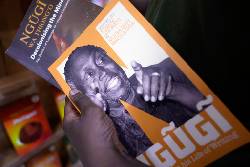NAIROBI, Kenya (AP) — In a bookstore in Kenya’s capital, the proprietor arranged a shelf exclusively carrying books by Kenyan author Ngũgĩ wa Thiong’o, who died Wednesday in the United States.
Bennet Mbata, who has sold African literature at the Nuria Bookstore for more than 30 years in the capital, Nairobi, said he enjoyed reading Ngũgĩ’s writing and is sad “he’ll never write again.”
Kenya President William Ruto on Thursday paid tribute to the man he called “the towering giant of Kenyan letters,” saying Ngũgĩ’s courage shaped thoughts around social justice and abuse of political power.
“His patriotism is undeniable, and even those who disagree with him will admit that Prof Thiong’o’s discourse always sprang forth from a deep and earnest quest for truth and understanding, devoid of malice, hatred or contempt,” Ruto wrote on X.
Following Ngũgĩ’s death at 87 in Bedford, Georgia, Kenyans are reminiscing about the days his literature criticized an autocratic administration, which led to his arrest and imprisonment in the 1970s.
Macharia Munene, a professor of history and international relations at United States International University-Africa in Nairobi, told The Associated Press on Thursday that Ngũgĩ’s writing was “hard hitting” but also a “true reflection of society.” Munene said he regrets Thiong’o didn’t receive the Nobel Prize for Literature despite several nominations.
Munene described the author as one of the few African writers whose writing was different.
“He wrote English like an African, another gift that very few people have,” Munene said, noting that Ngũgĩ later transitioned to only writing in his native Kikuyu language.
Munene urged current writers to be “true to themselves” and write from their hearts, but cautioned there may be some “hard consequences like was the case for Ngũgĩ.”
Ngũgĩ lived in exile for decades and escaped attempted assassination twice following his criticism of President Daniel Moi's administration in the 1970s and 1980s.
Current Kenyan opposition leader Raila Odinga sent condolences to the author’s family, saying “a giant African has fallen.”
The author’s son and fellow writer, Mukoma Wa Ngũgĩ, posted a tribute on X: “I am me because of him in so many ways, as his child, scholar and writer.”
At Ngũgĩ's Kenyan home in Kamirithu, in Kiambu county in the outskirts of Nairobi, workers were seen trimming fences and clearing bushes in preparation for mourners and visitors alike.
Fellow Kenyan writer David Maillu, 85, told the AP that Ngũgĩ “touched the hearts of the people” by writing about the “cultural destruction” that took place during colonization.
Born in 1938, Ngũgĩ’s first books told the story of British colonial rule and the uprising by Mau Mau freedom fighters.
Since the 1970s, Ngũgĩ’ mostly lived in exile overseas, emigrating to England and eventually settling in California, where he was a Distinguished Professor of English and Comparative Literature at the University of California, Irvine.
...


